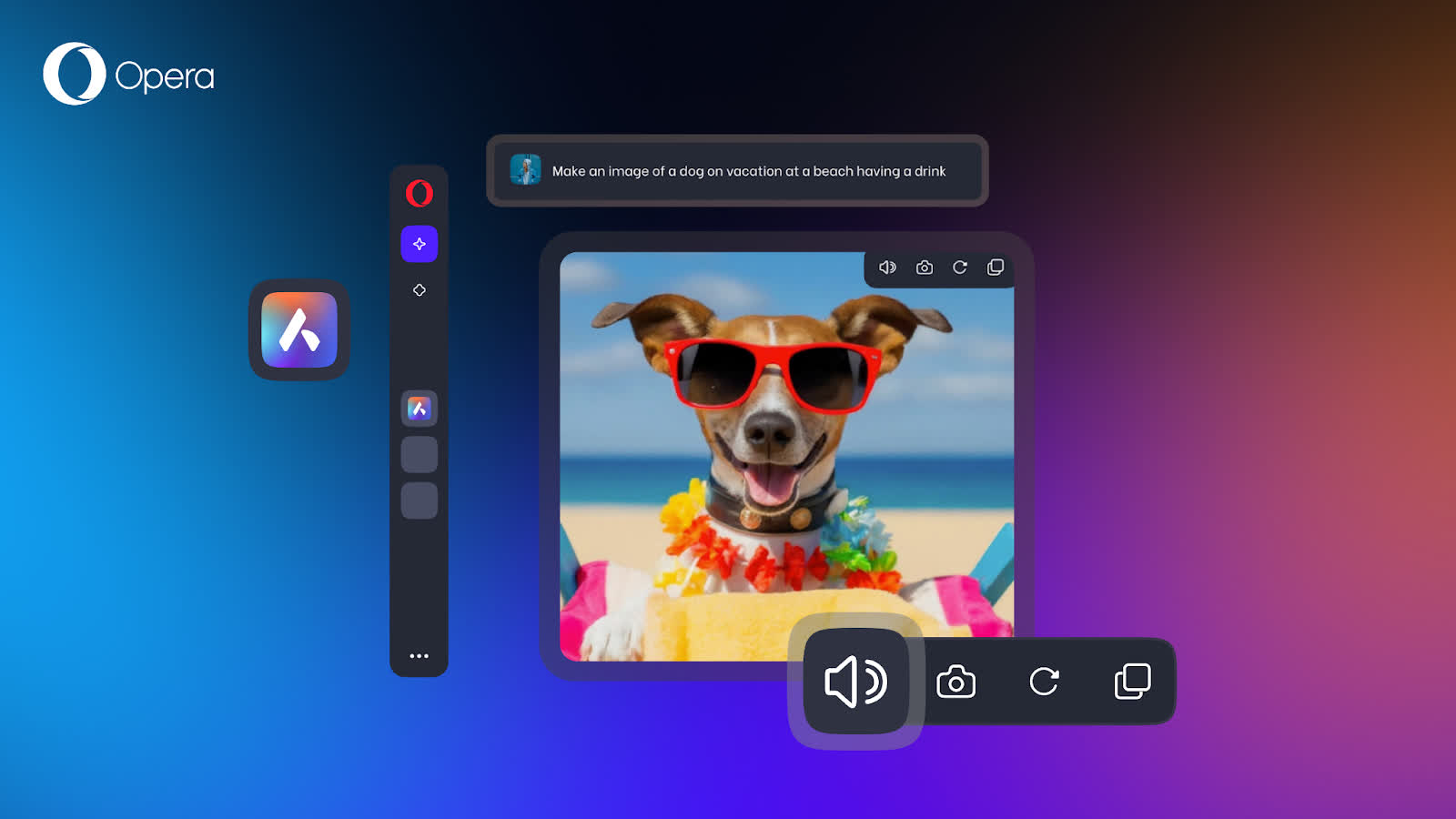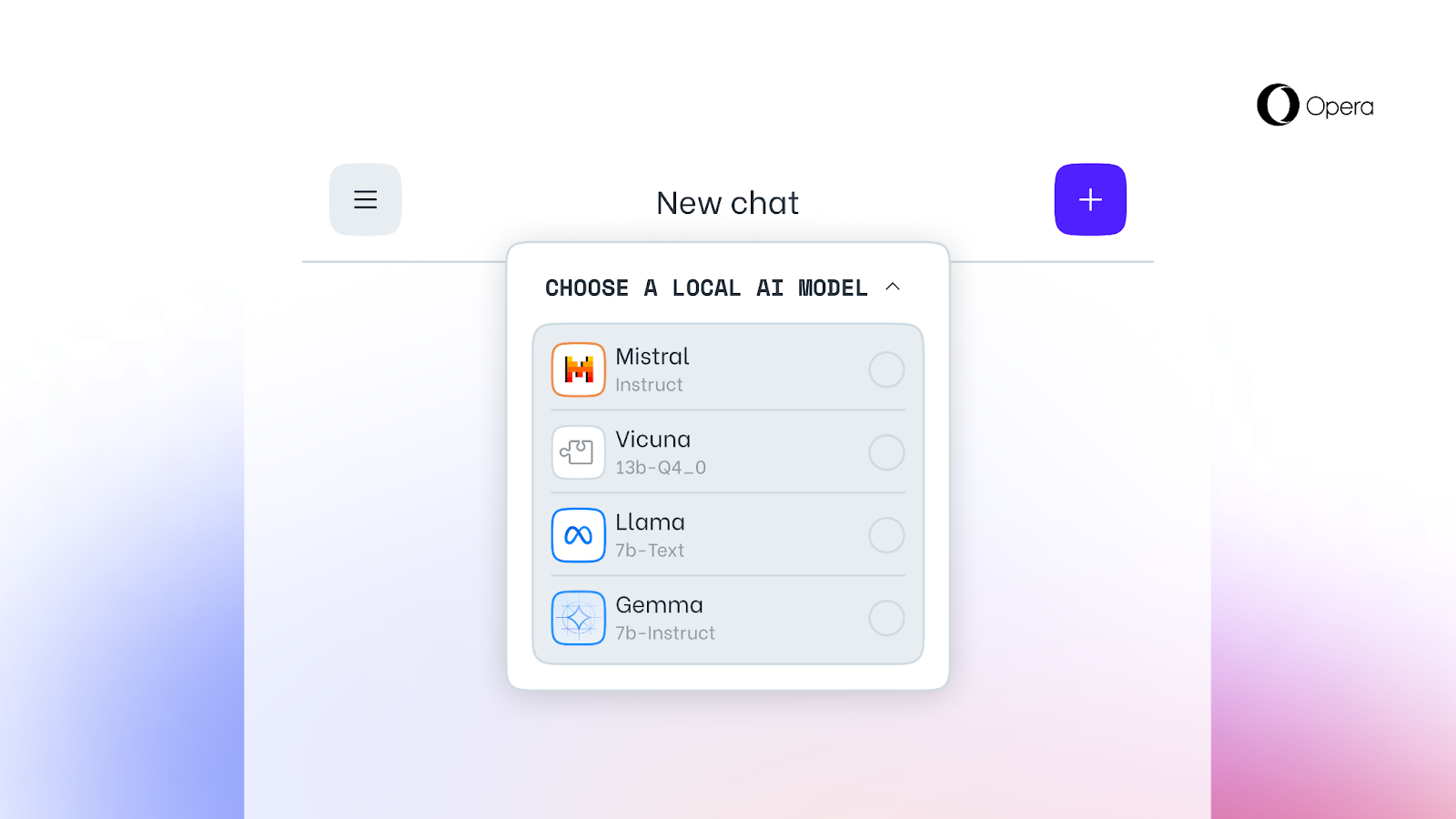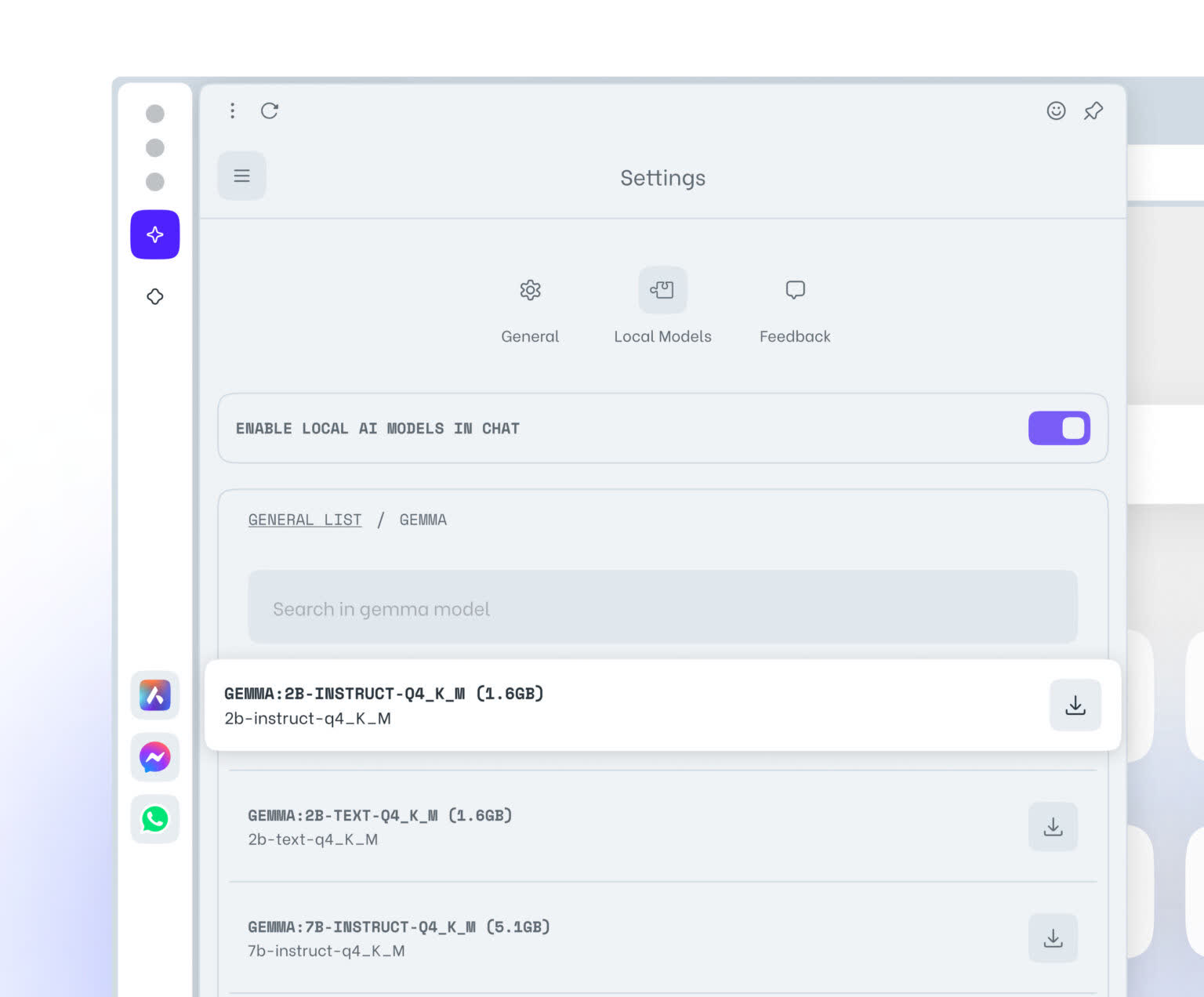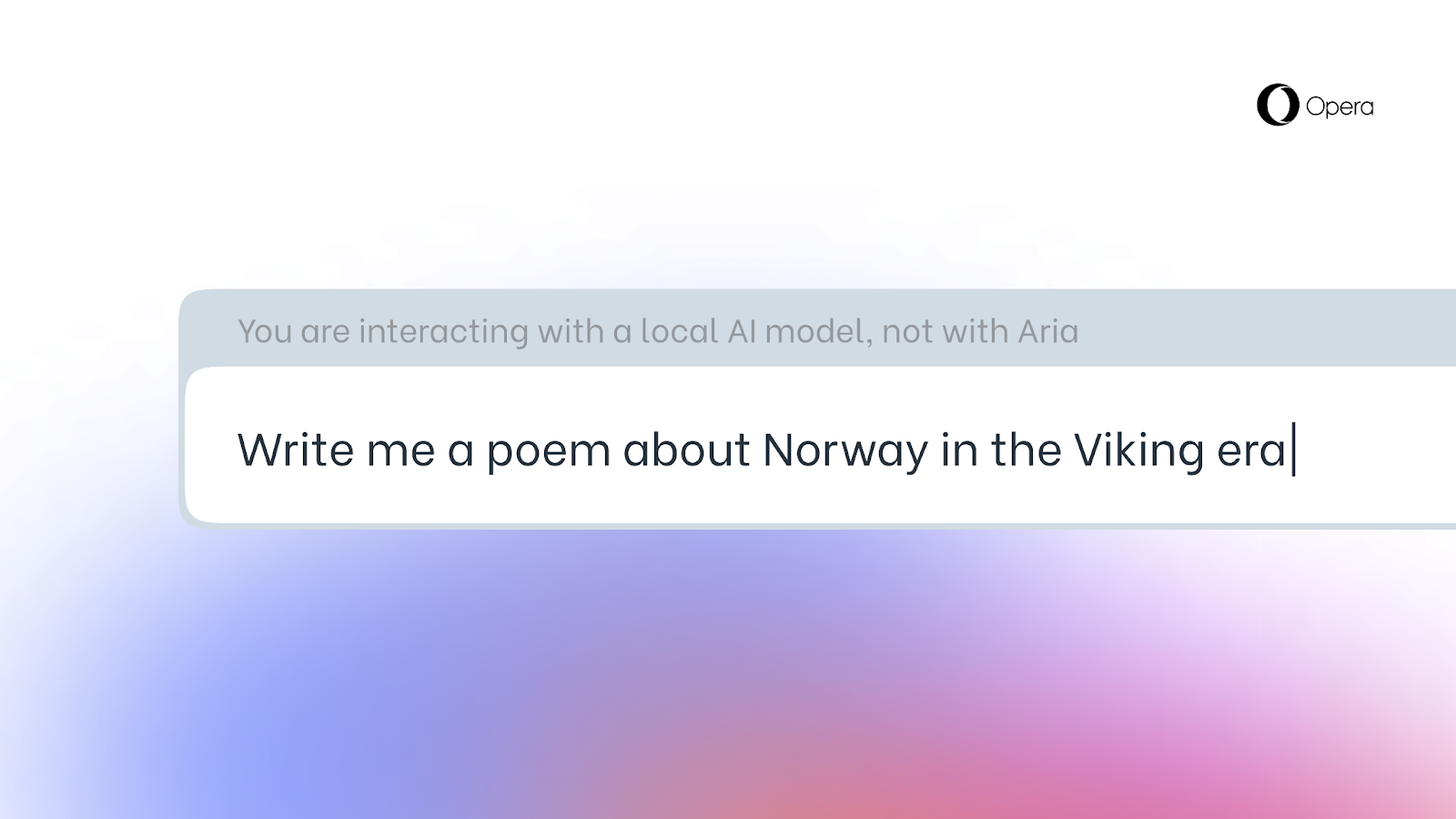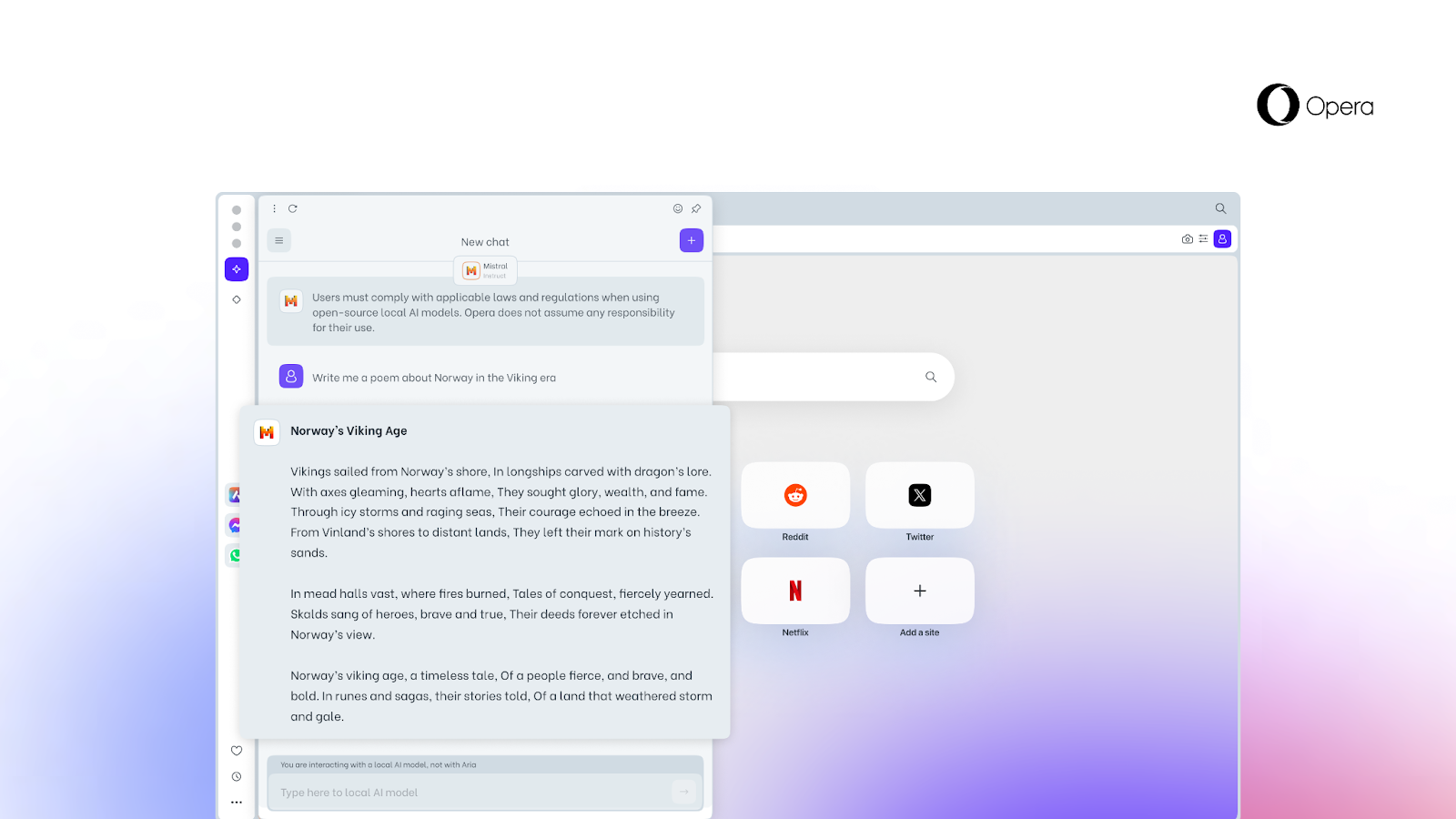Once the bugs have been ironed out, the features are released as stable, and once every few weeks the streams are all refreshed. You can follow all three if you want, but please note that you shouldn't entrust valuable data to anything other than the released stable stream.
What's New
Opera unveils Opera One R2 in Developer
It's been nearly a year since we launched Opera One, our flagship browser. It laid the foundations for modern browsing by introducing an integrated AI assistant – Aria – at its center. Today we're giving you a first glance at Opera One R2, a reimagined and updated version of our browser shipping in developer today, with its mainstream release scheduled for later this year. This release will expand on the innovations that characterize Opera One, and bring improvements in key areas such as: Multimedia, AI and Tab management.
Multimedia at the forefront of browsing
Modern browsing is all about multimedia content: music streaming is at an all-time high and video content comprises more than two thirds of the total internet traffic worldwide. You probably have a song or a video playing in the background while reading this blog post – I certainly do as I'm writing it. That's why we want to make Multimedia a focal point of this update to Opera One.
Opera One R2 upgrades the Multimedia management capabilities of the browser that let you control the content you're watching or listening to. You'll be able to control your music and videos without interrupting your browsing activities.
If you want to pause or skip a song, you can do so by hovering over the player icon on the sidebar; no need to open it or switch tabs. Maybe you're a reader, or a writer, or just have to do a lot of spreadsheets, regardless, this is great for all of us who use music to focus or simply enjoy while browsing! Additionally, the music will automatically stop when you play a video or have a call, and restart when you pause or hang up.
You can also control the videos you're watching by making them pop out as a floating module. This allows you to drag the video wherever you want, as well as to resize it to fit your screen however you like. This feature comes in handy at all times! Say you want to watch your country's match while you're working, or have a tutorial explaining how to Excel next to your spreadsheet. Regardless of the case, you'll be able to have the video wherever you want it. You also get total control over it: you can pause, rewind or skip forward from the floating module.
Latest AI capabilities
A year ago, with Opera One, we introduced the first browser with native browser AI, Aria, which runs on Opera's AI engine – Composer. Said engine chooses the right LLMs to tap into, like the ones from Google or OpenAI, depending on your browsing needs. It's a free-to-use AI service that can help you with many tasks like summarizing content, writing reports, translating documents or even planning trips and events! You can access Aria through the sidebar panel of the browser as well as through a Command Line shortcut* activated by Ctrl + / or Cmd + /.
With the release of Opera One R2 we're improving Aria's capabilities to give you even more tools while browsing the web. We've brought you bi-weekly Aria upgrades in the past as part of our experimental AI Feature Drops. Now we're gathering the most important Feature Drops into Opera One R2, to enhance Aria's capabilities and improve your daily browsing experience.
With Opera One R2, you'll get new Aria Features such as Image Generation and Voice Output. Images are crucial in today's web, and now you can prompt Aria to generate a picture of a cute dog in space, a birthday card or an asset for a presentation.
If you like the images that Aria has generated for you, you can save them by right clicking it and selecting the save option. Additionally, you can keep giving prompts to Aria to tweak the image to your liking.
Additionally, Aria has the capability to read answers out loud, making it a great feature for accessibility and for multitasking. This is useful, for example, if reading is not your preferred format to get information, or simply want to get information read out loud for you. Or if you're shopping online and have questions regarding a product, you can hear Aria's answers about it while you keep looking for what you want.
You can also make queries using images as supporting information with Aria's Image Understanding capabilities. For example, you can take a picture of a math or a programming problem and ask Aria to help you understand it and provide solutions.
You can also use it to help identify the specific model of a product you might like to buy, for example a pair of shoes that you found online:
The relevant information is highlighted for you, in this case it's the shoe's model. You can click on it and then Aria will automatically open a search about the shoes you're looking for – only Aria can do that!
Another Aria update that you'll find in Opera One R2 is Page Context mode. It lets you do page deep dives with ease by summarizing, extracting information and even translating content from the webpage you're on. You can access this feature with the Command Line shortcut*: Ctrl + / for Windows and Cmd + / for Mac, and then pressing the tab key once.
Revamped Tab management
We understand how important Tabs are, and how they're a cornerstone of your daily browsing activities. After all, we invented them and then reinvented them! That's why we brought Tab Islands to Opera One over a year ago, and now we're bringing yet another upgrade to them with Opera One R2. We're introducing a Split Screen feature, allowing you to open two tabs at the same time and parallel to each other.
If you're working on two things at the same time you'll find this feature particularly useful. Let's say that you're comparing two documents and need to have them open side by side. You can open both documents in the same browser window to work on them at the same time. Or perhaps you're into design and need to have some inspiration alongside the board you're working on, then the Split Screen feature will help you out.
Previous Release Notes:
Aria now boosted by Google's Gemini models
Today we're thrilled to announce that we've teamed up with Google Cloud to integrate Gemini models into our browser AI, Aria.
Aria is unique because it doesn't just utilize one provider or LLM. Powered by our very own Composer AI engine, Aria can plug into over 150 local LLM variants from around 50 families of models. That way, you can decide for yourself what you like and what best suits your needs.
Now we've added Google's Gemini – a modern, powerful, and user-friendly LLM that is the company's most capable model yet. So you'll get the most current information, along with exceptionally high performance.
Image generation and voice output in Aria powered by Google Cloud
Google Cloud is also behind our most recent Feature Drop, with free image generation from the Imagen 2 model on Vertex AI now available through Aria in Opera One Developer. And that's not all! Aria can now read out responses in a conversational-like fashion, thanks to Google's ground-breaking text-to-audio model. Take a tour and see how both features work here.
Previous Release Notes:
Opera One Developer becomes the first browser with built-in local LLMs – ready for you to test
Using an LLM or Large Language Model is a process that typically requires data being sent to a server. Local LLMs are different, as they allow you to process your prompts directly on your machine without the data you're submitting to the local LLM leaving your computer.
Today, as part of our AI Feature Drops program, we are adding experimental support for 150 local LLM variants from ~50 families of models to our browser. This marks the first time local LLMs can be easily accessed and managed from a major browser through a built-in feature. Among them, you will find:
- Llama from Meta
- Vicuna
- Gemma from Google
- Mixtral from Mistral AI
- And many families more
The models are available from today on in the developer stream of Opera One.
Using Local Large Language Models means users' data is kept locally, on their device, allowing them to use AI without the need to send information to a server. We are testing this new set of local LLMs in the developer stream of Opera One as part of our AI Feature Drops Program, which allows you to test early, often experimental versions of our AI feature set.
As of today, the Opera One Developer community is getting the opportunity to select the model they want to process their input with, which is quite beneficial to the early adopter community that might have a preference for one model over another. This is so bleeding edge, that it might even break. But innovation wouldn't be fun without experimental projects, would it?
Testing local LLMs in Opera Developer
Did we get your attention yet? To test the models, you have to upgrade to the newest version and do the following:
- Open the Aria Chat side panel (as before)
- On the top of the chat there will be a drop-down saying "Choose local mode"
- Click "Go to settings"
- Here you can search and browse which model(s) you want to download. Download e.g GEMMA:2B-INSTRUCT-Q4_K_M which is one of the smaller and faster models by clicking on the download button to the right
- After downloading is complete click the menu button on the top left and start a new chat
- On the top of the chat there will be a drop-down saying "Choose local mode"
- Select the model you just downloaded
- Type in a prompt in the chat, the local model will answer
Choosing a local LLM will then download it to your machine. Please beware that each one of them requires between 2-10 GB of local storage space and that a local LLM is likely to be considerably slower in providing output than a server-based one as it depends on your hardware's computing capabilities. The local LLM will be used instead of Aria, Opera's native browser AI until you start a new chat with Aria or simply switch Aria back on.
With this feature, we are starting to explore some potential future use cases. What if the browser of the future could rely on AI solutions based on your historic input while containing all of the data on your device? Food for thought. We'll keep you posted about where these explorations take us.
Interesting local LLMs to explore
Some interesting local LLMs to explore include Code Llama, an extension of Llama aimed at generating and discussing code, with a focus on expediting efficiency for developers. Code Llama is available in three versions: 7, 13, and 34 billion parameters. It accommodates numerous widely-used programming languages such as Python, C++, Java, PHP, Typescript (JavaScript), C#, Bash, among others.
Variations:
- instruct – fine-tuned to generate helpful and safe answers in natural language
- python – a specialized variation of Code Llama further fine-tuned on 100B tokens of Python code
- code – base model for code completion
Phi-2, released by Microsoft Research, is a 2.7B parameter language model that demonstrates outstanding reasoning and language understanding capabilities. Phi-2 model is best suited for prompts using Question-answering, chat, and code formats.
Mixtral is designed to excel at a wide range of natural language processing tasks, including text generation, question answering, and language understanding. Key benefits: performance, versatility, and accessibility.
We will of course keep adding more interesting models as they appear in the AI community.
Release Notes:
- CHR-9215 Update Chromium on master to 112.0.5596.2
- DNA-103304 The search bar calculator cannot calculate multiplying/dividing negative or positive numbers by negative numbers correctly
- DNA-105341 Make possible to disable opera_feature_* defined in args_default.gni to true'
- DNA-105807 Show embedded YouTube video on Start Page
- DNA-105816 Animate tab removing
- DNA-105907 [Tab Islands] Tab island handle clickable hotspot should be expanded
- DNA-105955 Use Wallpapers API for displaying images and videos
- DNA-105956 Place wallpaper iframe on React Start Page
- DNA-105996 [add-site-modal] autocomplete inserts full URL inside current URL when edit inside
- DNA-105998 Crash at opera::BrowserSidebarItemViewViews::ShowTooltip()
- DNA-106003 Show 'new tab in island' button on top of tab island edge
- DNA-106051 [Tab Islands] Crash when creating more than 8 tab islands in a workspace
- DNA-106081 Shuffle button doesn't work for current date wallpaper
- DNA-106103 Mechanism for additional scopes and extensions mapping
- DNA-106104 Update API versioning
- DNA-106128 Verify updated audio hashes in PipelineIntegrationRegressionTest
- DNA-106129 PipelineIntegrationRegressionTest.BasicPlayback/2 fails
- DNA-106168 EasySetup update
- DNA-106194 [Mac] Support for preinstalled extensions in Mac installer
- DNA-106207 Crash on duplicating a pinned tab
- DNA-106232 [Tab strip][Drag&Drop] Do not attempt to drag tab when it's clicked
- DNA-106238 Use goma on stable Windows builds
- DNA-106299 Enable pre-installing extensions + increment protocol version to v5
- DNA-106300 Fix rule for generating archive_browser_sym_files on crossplatform builds
- DNA-106313 [Tab Island] Add tab in tab island is causing tab strip content to shift when hovering over tab island
- DNA-106345 Crash on calling getRichWallpaper
- DNA-106355 Rich hints fail to compile
- DNA-106372 [Tab islands] Empty space between active tab and stacked tabs element
- DNA-106373 Use ARM nodejs binaries
- DNA-106384 Fix path resolving in optimize_webui.py
- DNA-106387 Animate tab removing within tab island
- DNA-106395 [accessibility] Tab island handle button not visible in accessibility tree
- DNA-106405 Fix crash related to getAccessToken
- DNA-106408 [Tab islands] DCHECK invoked on context menu if pinned tabs are present
- DNA-106412 Content of popup not generated for some extensions when using more then one worksapce
- DNA-106416 Allow chrome://rich-wallpaper to be embedded in startpage and gx corner
- DNA-106433 Extend Easy Setup API

